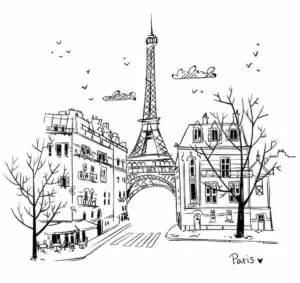French, often referred to as the language of love, is abundant in descriptive words that capture various shades of emotions and descriptions. Adjectives, in particular, play a vital role in this, allowing speakers to convey their feelings and observations with nuance and precision. Whether you’re talking about a person, the weather, or an object, there’s always a perfect French adjective to suit the situation. In this article, we’ll dive into some of the most popular French adjectives and provide context on how to use them effectively.

✅ AI Essay Writer ✅ AI Detector ✅ Plagchecker ✅ Paraphraser
✅ Summarizer ✅ Citation Generator
Positive French Adjectives to Describe a Person
If you want to compliment someone or express admiration, these adjectives are perfect. They encapsulate positive qualities that are universally acknowledged.
| French | English |
|---|---|
| Joli(e) | Pretty |
| Intelligent(e) | Smart |
| Gentil(le) | Kind |
| Courageux(se) | Brave |
| Drôle | Funny |
| Charmant(e) | Charming |
| Passionné(e) | Passionate |
| Créatif(ve) | Creative |
| Énergique | Energetic |
| Motivé(e) | Motivated |
Examples:
- Marie est une fille jolie et intelligente. (Marie is a pretty and smart girl.)
- Lucas est toujours gentil avec tout le monde. (Lucas is always kind to everyone.)
- Elle admire les personnes courageuses. (She admires brave people.)
- Tu es vraiment drôle aujourd’hui! (You are really funny today!)
Negative French Adjectives to Describe a Person
| French | English |
|---|---|
| Méchant(e) | Mean |
| Paresseux(se) | Lazy |
| Égoïste | Selfish |
| Ennuyeux(se) | Boring |
| Têtu(e) | Stubborn |
| Lourd(e) | Annoying |
| Impoli(e) | Rude |
| Faible | Weak |
| Maladroit(e) | Clumsy |
| Distant(e) | Aloof |
While it’s always better to focus on the positives, there are times when one might need to use negative adjectives. These words can help describe challenges or issues someone might be facing.
Examples:
- Il ne faut pas être égoïste dans une relation. (One shouldn’t be selfish in a relationship.)
- Mon frère est un peu paresseux le matin. (My brother is a bit lazy in the morning.)
- Elle est têtue mais elle a bon cœur. (She is stubborn, but she has a good heart.)
French Adjectives to Describe Weather
| French | English |
|---|---|
| Ensoleillé | Sunny |
| Nuageux | Cloudy |
| Pluvieux | Rainy |
| Orageux | Stormy |
| Ventilé | Windy |
| Froid | Cold |
| Chaud | Hot |
| Humide | Humid |
| Sec | Dry |
| Glacial | Freezing |
Describing the weather is often a common topic of conversation. These adjectives can help you convey the exact atmospheric conditions you’re experiencing.
Examples:
- Aujourd’hui, il fait chaud et humide. (Today, it’s hot and humid.)
- En hiver, le temps est souvent froid et glacial. (In winter, the weather is often cold and freezing.)
French Adjectives to Describe Objects
| French | English |
|---|---|
| Ancien(ne) | Old/ancient |
| Nouveau(elle) | New |
| Grand(e) | Big/large |
| Petit(e) | Small/tiny |
| Lourd(e) | Heavy |
| Léger(ère) | Light (weight) |
| Coloré(e) | Colorful |
| Brillant(e) | Shiny |
| Rugueux(se) | Rough |
| Doux(ce) | Soft |
Whether you’re shopping, decorating, or simply describing objects around you, these adjectives will come in handy.
Examples:
- J’adore cette ancienne horloge dans ta maison. (I love this old clock in your house.)
- Ce vase est très brillant et coloré. (This vase is very shiny and colorful.)
How to Use Several Adjectives in One Sentence in French
When constructing sentences in French, it’s crucial to understand the placement and order of adjectives. Unlike English where adjectives predominantly come before the noun, in French, they generally follow the noun they describe. However, some common adjectives like “grand” (big) or “petit” (small) are exceptions to this rule. Another key difference is the sequencing of adjectives. The French typically follow an order: size, age, shape, color, and then origin or material. This order ensures that the description flows naturally and is easily understood by listeners or readers. Knowing this structure is vital for anyone looking to master the art of descriptive French.
Examples:
- Elle a un grand sac ancien marron. (She has a big old brown bag.)
- C’est une petite boîte colorée en bois. (It’s a small colorful wooden box.)
French adjectives add depth and color to the language, allowing speakers to articulate their feelings and observations vividly. With this guide, you’ll be better equipped to describe people, objects, and even the weather in French. Immerse yourself and enjoy the beauty and expressiveness that French adjectives offer.
FAQ
Follow us on Reddit for more insights and updates.





Comments (0)
Welcome to A*Help comments!
We’re all about debate and discussion at A*Help.
We value the diverse opinions of users, so you may find points of view that you don’t agree with. And that’s cool. However, there are certain things we’re not OK with: attempts to manipulate our data in any way, for example, or the posting of discriminative, offensive, hateful, or disparaging material.